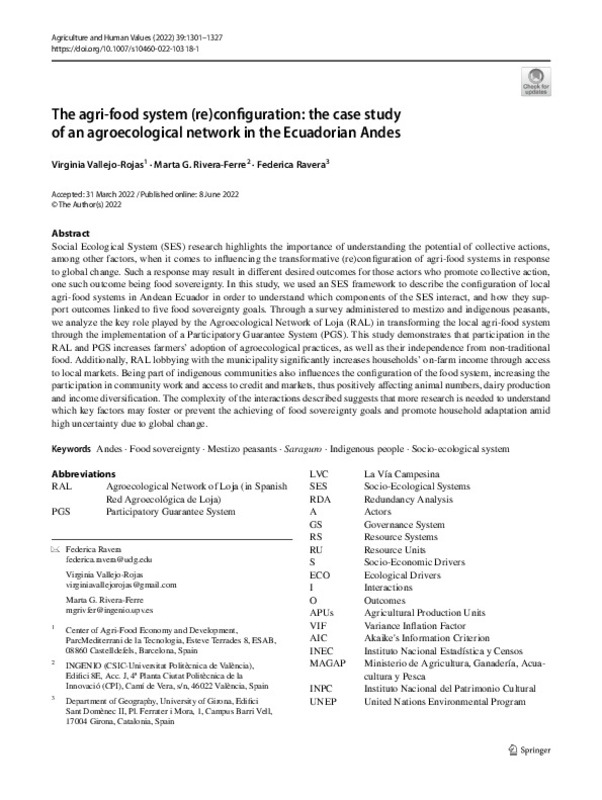JavaScript is disabled for your browser. Some features of this site may not work without it.
Buscar en RiuNet
Listar
Mi cuenta
Estadísticas
Ayuda RiuNet
Admin. UPV
The agri-food system (re)configuration: the case study of an agroecological network in the Ecuadorian Andes
Mostrar el registro sencillo del ítem
Ficheros en el ítem
| dc.contributor.author | Vallejo-Rojas, Virginia
|
es_ES |
| dc.contributor.author | Rivera-Ferre, Marta Guadalupe
|
es_ES |
| dc.contributor.author | Ravera, Federica
|
es_ES |
| dc.date.accessioned | 2024-01-11T19:02:57Z | |
| dc.date.available | 2024-01-11T19:02:57Z | |
| dc.date.issued | 2022-12 | es_ES |
| dc.identifier.issn | 0889-048X | es_ES |
| dc.identifier.uri | http://hdl.handle.net/10251/201834 | |
| dc.description.abstract | [EN] Social Ecological System (SES) research highlights the importance of understanding the potential of collective actions, among other factors, when it comes to influencing the transformative (re)configuration of agri-food systems in response to global change. Such a response may result in different desired outcomes for those actors who promote collective action, one such outcome being food sovereignty. In this study, we used an SES framework to describe the configuration of local agri-food systems in Andean Ecuador in order to understand which components of the SES interact, and how they support outcomes linked to five food sovereignty goals. Through a survey administered to mestizo and indigenous peasants, we analyze the key role played by the Agroecological Network of Loja (RAL) in transforming the local agri-food system through the implementation of a Participatory Guarantee System (PGS). This study demonstrates that participation in the RAL and PGS increases farmers' adoption of agroecological practices, as well as their independence from non-traditional food. Additionally, RAL lobbying with the municipality significantly increases households' on-farm income through access to local markets. Being part of indigenous communities also influences the configuration of the food system, increasing the participation in community work and access to credit and markets, thus positively affecting animal numbers, dairy production and income diversification. The complexity of the interactions described suggests that more research is needed to understand which key factors may foster or prevent the achieving of food sovereignty goals and promote household adaptation amid high uncertainty due to global change. | es_ES |
| dc.description.sponsorship | Open Access funding provided thanks to the CRUE-CSIC agreement with Springer Nature. We thank Narcisa Medina and Rovin Andrade, local leaders of the rural Andean parishes Jimbilla and San Lucas of the Loja canton; and, Nancy Huaca, coordinator of the groecological Network of Loja (RAL); who have shown their aperture for carrying out the research in eight communities of their locality and have shared their experiences and knowledges. This research was part of a PhD study funded by the National Secretariat for Science, Technology and Innovation (SENESCYT) of Ecuadorian government. The corresponding author has been funded by AXA Research Fund (2016) and Ramón i Cajal fellowship (RYC2018-025958-I) funded by Ministerio de Ciencia, nnovación y Universidades (Spain) | es_ES |
| dc.language | Inglés | es_ES |
| dc.publisher | Springer-Verlag | es_ES |
| dc.relation.ispartof | Agriculture and Human Values | es_ES |
| dc.rights | Reconocimiento (by) | es_ES |
| dc.subject | Andes | es_ES |
| dc.subject | Food sovereignty | es_ES |
| dc.subject | Mestizo peasants | es_ES |
| dc.subject | Saraguro | es_ES |
| dc.subject | Indigenous people | es_ES |
| dc.subject | Socio-ecological system | es_ES |
| dc.title | The agri-food system (re)configuration: the case study of an agroecological network in the Ecuadorian Andes | es_ES |
| dc.type | Artículo | es_ES |
| dc.identifier.doi | 10.1007/s10460-022-10318-1 | es_ES |
| dc.relation.projectID | info:eu-repo/grantAgreement/MCIU//RYC-2018-025958-I/ | es_ES |
| dc.rights.accessRights | Abierto | es_ES |
| dc.contributor.affiliation | Universitat Politècnica de València. Instituto de Gestión de la Innovación y del Conocimiento - Institut de Gestió de la Innovació i del Coneixement | es_ES |
| dc.description.bibliographicCitation | Vallejo-Rojas, V.; Rivera-Ferre, MG.; Ravera, F. (2022). The agri-food system (re)configuration: the case study of an agroecological network in the Ecuadorian Andes. Agriculture and Human Values. 39(4):1301-1327. https://doi.org/10.1007/s10460-022-10318-1 | es_ES |
| dc.description.accrualMethod | S | es_ES |
| dc.relation.publisherversion | https://doi.org/10.1007/s10460-022-10318-1 | es_ES |
| dc.description.upvformatpinicio | 1301 | es_ES |
| dc.description.upvformatpfin | 1327 | es_ES |
| dc.type.version | info:eu-repo/semantics/publishedVersion | es_ES |
| dc.description.volume | 39 | es_ES |
| dc.description.issue | 4 | es_ES |
| dc.relation.pasarela | S\506865 | es_ES |
| dc.contributor.funder | AXA Research Fund | es_ES |
| dc.contributor.funder | Ministerio de Ciencia, Innovación y Universidades | es_ES |
| dc.contributor.funder | Secretaría de Educación Superior, Ciencia, Tecnología e Innovación, Ecuador | es_ES |








